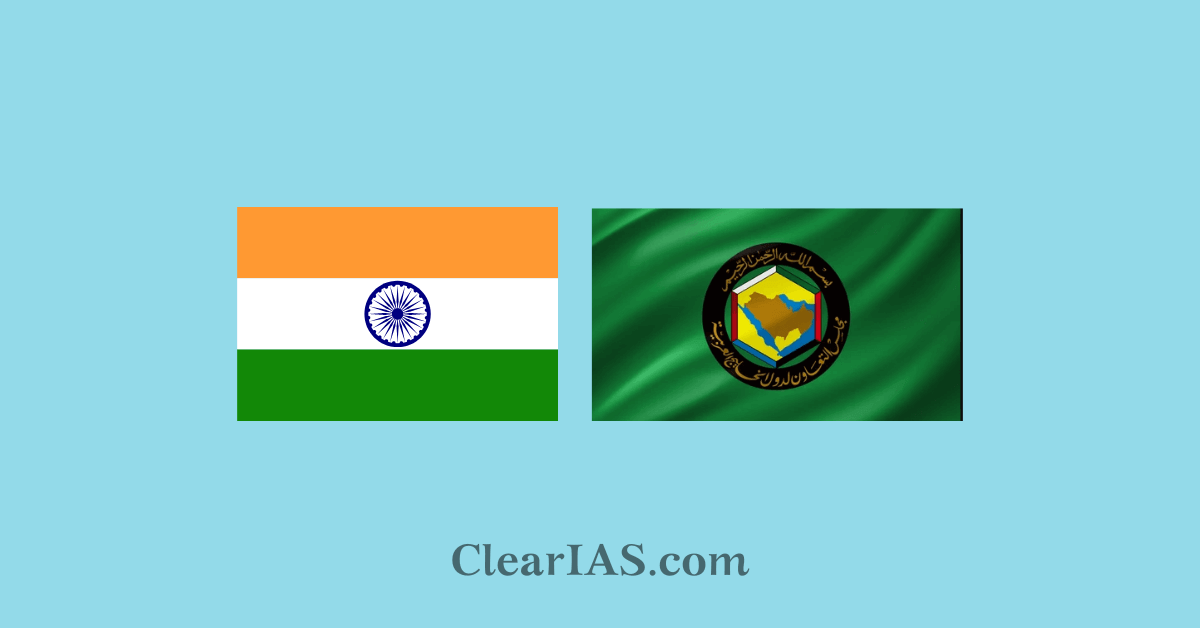 The Gulf region has historical, political, economic, strategic, and cultural significance for India. Read here to know more about Gulf Cooperation Council (GCC) and its relations with India.
The Gulf region has historical, political, economic, strategic, and cultural significance for India. Read here to know more about Gulf Cooperation Council (GCC) and its relations with India.
With the outrage by gulf countries due to controversial remarks by BJP spokespersons’, the Indian Government is carrying out major diplomatic exercises to pacify the concerns of these nations.
The gulf countries hold strategic and economic significance to India.
Hence strain in relations with GCC would have negative consequences for the nation.
Gulf Cooperation Council (GCC)

The Gulf Cooperation Council (GCC) was established by an agreement concluded on 25 May 1981 in Riyadh, Saudi Arabia.
The agreement was among Bahrain, Kuwait, Oman, Qatar, Saudi Arabia, and UAE in view of their special relations, geographic proximity, similar political systems based on Islamic beliefs, joint destiny, and common objectives.
The official language is Arabic.
The GCC members and Yemen are also members of the Greater Arab Free Trade Area (GAFTA).
GCC comprises some of the fastest-growing economies in the world, mainly due to an increase in oil and natural gas revenues coupled with a building and investment boom backed by reserves, etc.
The GCC Charter states that the basic objectives are:
- To affect coordination, integration, and interconnection between member states in all fields in order to achieve unity between them.
- To deepen and strengthen relations, links, and areas of cooperation now prevailing between their peoples in various fields.
- To formulate similar regulations in various fields including the following:
- Economic and financial affairs.
- Commerce, customs, and communications.
- Education and culture.
- Social and health affairs.
- Information and tourism.
- Legislative and administrative affairs.
- To stimulate scientific and technological progress in the fields of industry, mining, agriculture, water, and animal resources: to establish scientific research: to establish joint ventures, and encourage cooperation by the private sector for the good of their peoples.
India and Gulf Cooperation Council (GCC)
The GCC countries, namely Bahrain, Kuwait, Oman, Qatar, Saudi Arabia, and UAE, are moving ahead with their economic integration efforts and offer tremendous potential for cooperation in trade, investment, energy, workforce, etc.
India has traditional and friendly relations with all GCC member states.
The GCC has emerged as a major trading partner of India. It has vast potential as India’s investment partner in the future.
- The GCC’s substantial oil and gas reserves are of utmost importance for India’s energy needs.
- The GCC countries collectively host a large Indian expatriate community.
- The GCC offers tremendous potential for cooperation in trade, investment, energy, workforce, etc.
India’s relations with the Gulf Cooperation Council (GCC) countries, especially Saudi Arabia and the United Arab Emirates (UAE), have witnessed a significant upgradation since 2015, across the areas of trade, investments, counter-terrorism, and security cooperation.
India-GCC: Economic and Commercial Relations
India enjoys traditionally cordial relations and cooperation with the GCC. India’s old, historical ties with the GCC States, coupled with increasing imports of oil and gas, growing trade and investment, and the presence of approximately 6.5 million Indian workers in the region, are of vital interest to India.
The Gulf countries provide an excellent market potential for India’s manufactured goods and services, especially in project services exports.
Around 10 million Indians live across the Gulf, sending remittances of about $45 billion annually on average, according to certain estimates.
India was the largest recipient of remittances in the world in 2021, receiving around $87 billion, approximately 50 percent of which came from the Gulf, according to a World Bank report.
Data from India’s Ministry of Commerce showed that India’s exports to the GCC countries in 2021-22 increased to about USD 44 billion as against USD 27.8 billion in 2020-21, a growth of over 58 percent. This accounted for 10.4 percent of India’s total exports in 2021-22.
On the import front, India witnessed a rise of 85.8 percent compared to 2020-21, with total imports summing up to USD 110.73 billion, accounting for 18 percent of India’s total imports.
India’s dependency on Gulf for Oil
According to the Union Ministry’s PPAC (Petroleum Planning & Analysis Cell) report, India imported 212.2 million tonnes of crude oil in 2021-22 from 42 different countries.
Most of the oil that India received during this period was from the Gulf countries, with Iraq being the largest exporter, supplying 22 percent of oil to India.
Iraq was followed by Saudi Arabia and the UAE, with Kuwait, too, emerging as one of the major exporters of oil to India.
India-GCC: Strategic relations
From a strategic point of view, India and GCC share the goal of political stability and security in the region.
The common political and security concerns of India and GCC include cross-border terrorism in the Gulf region and South Asia. The emerging common security perceptions create further opportunities for GCC-India cooperation in the future.
The GCC States are going through important changes and transformations; the process of understanding and integration is coming of age. Along with it the areas for cooperation are also widening beyond investments, trade & commerce, and sharing & development of human resources to security.
- India-GCC Industrial Conference: The first GCC-India Industrial Conference was held in Mumbai in February 2004, the second was held in Muscat in March 2006, the third was held in Mumbai in May 2007 and the fourth was held at King Abdullah Economic City, Jeddah in November 2015.
- India- GCC FTA: India and GCC signed a Framework Agreement for enhancing and developing economic cooperation between the two sides in New Delhi in August 2004. Two rounds of talks for finalizing aspects like tariff rules, rules of origin, etc have been held. The India-GCC FTA is under negotiation.
Recent developments
The vice president of India recently visited Qatar and the highlights of the visit are important to India-GCC relations as well:
India-Qatar Start-Up Bridge:
- The Vice President launched the “India-Qatar Start-Up bridge” that aims to link the start-up ecosystems of the two countries.
- India has emerged as the 3rd largest ecosystem for startups globally, with over 70,000 registered Startups.
- India is home to 100 unicorns with a total valuation of over USD 300 billion.
Qatar, as India’s trusted partner in its energy security, has been invited to be a partner for sustainability and to join the International Solar Alliance.
A Joint Business Council between Business Chambers of India and Qatar has been established and a Joint Task Force on Investments would take its work forward.
India’s trade with other GCC countries
UAE:
- The UAE was India’s third-largest trading partner in 2021-2022, and the second-largest for both exports (USD 28 billion) and imports (USD 45 billion) when these are counted individually.
Saudi Arabia
- At a total volume of USD 42.9 billion in 2021-22, Saudi Arabia was India’s fourth-largest trading partner.
- Imports from Saudi Arabia were the fourth largest at USD 34.1 billion (7%), up 50% from the previous year. Most of it was crude oil.
- It was India’s fifth-largest trading partner in 2021-22 at USD 34.3 billion.
Qatar accounts for 41% of India’s total natural gas imports.
For Oman, India was the 3rd largest (after UAE and China) source for its imports and the 3rd largest market (after UAE and Saudi Arabia) for its non-oil exports in 2019.
Way forward
India needs to focus on long-term plans for economic cooperation with GCC, beyond oil, GCC countries are also revolutionizing green energy. India can promote its green hydrogen mission in cooperation with GCC countries.
Other projects including renewable energy, higher education, technological innovation, smart cities, and space commerce are the areas GCC and India can diversify their cooperation.
Read: India-Kuwait Relations








✍️✍️